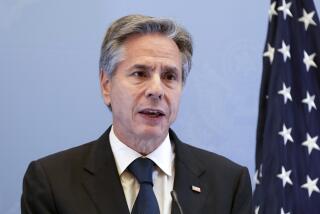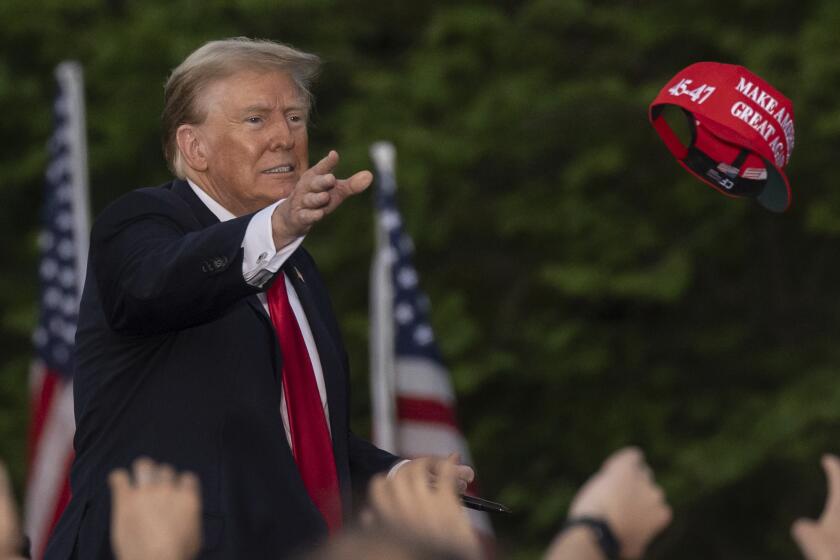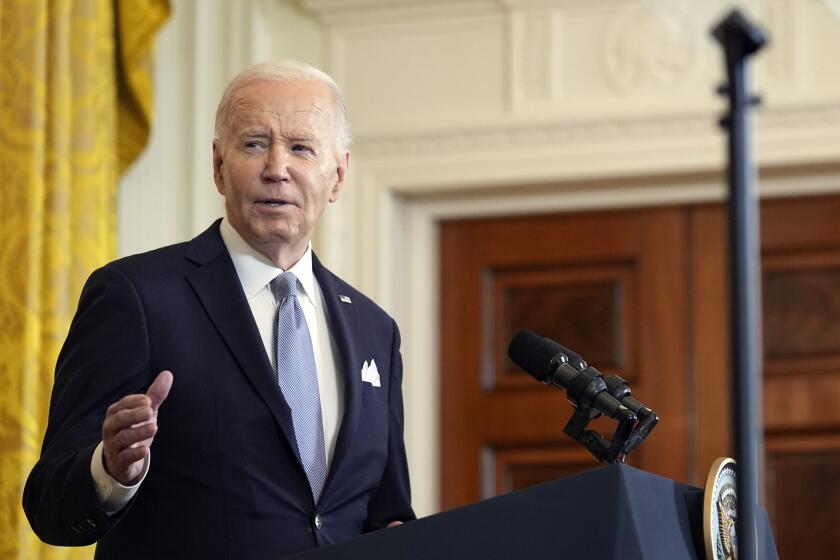Shultz Scored by Iran Probe Conservatives : They Say He Could Have Prevented Arms Sales by Resigning
Secretary of State George P. Shultz, whose testimony has cast the Administration’s sale of arms to Iran in a new and critical light, fell under blistering criticism himself Friday from congressional conservatives who charged that he could have prevented the disastrous arms sales if he had been bold enough to quit over them.
“I can’t escape the notion that had you opposed this flawed policy and were willing to resign over this policy difference . . . you could have stopped it dead in its tracks,” Rep. Henry J. Hyde (R-Ill.) told Shultz during his second and final day of testifying to the congressional committees investigating the Iran- contra affair.
“I doubt it very much,” Shultz replied. The secretary, who had vigorously opposed the sales from the outset, said he was repeatedly deceived into believing the deals were not going forward.
‘You Cut Yourself Out’
“You discussed your resignation on three separate occasions . . . but you did not discuss it in regard to what has turned out to be the major foreign policy disaster of this Administration,” Rep. Michael DeWine (R-Ohio) noted.
“In my opinion, you purposely cut yourself out from the facts,” DeWine added. “ . . . You walked off the field when the score was against you. You took yourself out of the game.”
“That’s one man’s opinion, and I don’t share it,” Shultz shot back.
On the other hand, Rep. Ed Jenkins (D-Ga.) said it would have been a mistake for Shultz to resign at the time the Iran-contra affair became publicly known last November.
“You were criticized because you did not resign in protest, yet it appears to me that of all times that the President of the United States needed you, it was at this particular time, to try to undo any harm that might have been done with our relations with other nations,” Jenkins said.
When the Iran arms sales and the diversion of profits to Nicaragua’s rebels became public last November, the question for Shultz was no longer whether to quit. Instead, he found himself fighting instead to hold onto his job amid charges that his criticism of the policies was tantamount to disloyalty.
Casey Opposed Shultz
It was disclosed during Shultz’s testimony that the late William J. Casey, then CIA director and one of President Reagan’s closest confidants, wrote a letter urging Reagan to fire Shultz and get “a new pitcher”--presumably one who would not press Reagan to acknowledge publicly that the sales had been a bumbling effort to swap arms for hostages.
“It’s clear there was unhappiness with Secretary Shultz,” said Sen. William S. Cohen (R-Me.), who quoted the Nov. 23 letter during his questioning of Shultz. “He was not following the party line.”
In addition, Rep. Dante B. Fascell (D-Fla.), another committee member, disclosed that Casey in mid-1986 suppressed an intelligence report showing that Iran was continuing to support terrorism.
Fascell, who is also chairman of the House Foreign Affairs Committee, charged that Casey withheld the report from Administration colleagues for fear it might undercut support for the arms sales.
Shultz’s Criticism
Shultz’s blunt criticism of the Iran-contra affair followed weeks of spirited defense by those who had carried out the Iranian arms sales and diverted some of the profits to Nicaragua’s rebels, despite a congressional ban on aid to the contras.
Committee members had watched in dismay as patriotic appeals by an unrepentant John M. Poindexter, Reagan’s former national security adviser, and Marine Lt. Col. Oliver L. North, his charismatic aide, generated an outpouring of public support.
Shultz, in his testimony Friday, continued his staggering account of how Casey, Poindexter, North and others had misled the President.
“I feel like I’d like to wring somebody’s neck,” Shultz said of his former Administration colleagues.
Although conservatives on the committees had their knives out for Shultz, most committee members welcomed him as nothing short of a hero.
Boren Thanks Witness
Sen. David L. Boren (D-Okla.) told Shultz he wanted “to simply stand up and cheer.” Cohen added: “Thank you for bringing the hearings back into focus.”
Shultz’s testimony did not appear to have stirred the public, however. “The phones have been virtually silent,” Boren said in an interview. “I don’t know what to make of it.”
Rep. Edward P. Boland (D-Mass.) also lavished praise on Shultz. He recalled that the secretary had acknowledged in previous testimony that he would give himself “less than an A-plus” for his role in the Iran-contra affair.
“You might have given yourself less than an A-plus when you were here in December before the Foreign Affairs Committee, but I’m going to give you an A-plus for yesterday and today,” Boland told Shultz.
‘A Voice of Reason’
“Regrettably,” he said, “you were viewed by the architects of these policies as an impediment to be circumvented, rather than as a voice of reason to be consulted.”
Shultz bristled when he was read Poindexter’s testimony asserting that the arms sales were in part a response to the State Department’s lack of success in finding a means of freeing U.S. hostages held in Lebanon. Poindexter had said that the White House National Security Council, whose staff he headed, “was the driving force from the beginning in trying to figure out how to get the hostages back.”
Shultz retorted: “The fight to do something about terrorism under the President’s direction has been led right out of the State Department, and we’ve been very strong and determined.”
He noted again with great ire that retired Air Force Maj. Gen. Richard V. Secord and his business partner Albert A. Hakim, acting as U.S. agents, had offered to help Iran in securing the release of 17 convicted terrorists held by Kuwait, in direct violation of stated U.S. policy.
Against Freeing Terrorists
“I don’t think the answer is to give the hostage takers what they want in terms of things like releasing the murderers who are being held in Kuwait,” Shultz said. “ . . . Lord preserve us from such bright ideas as that.”
Shultz said the Iran-contra affair’s damage to U.S. credibility overseas “has been temporary, and I think it is behind us.” Even though the Administration secretly sold weapons to Iran, Shultz said, it has “effectively revived” its so-called Operation Staunch, a highly public appeal to other countries not to help arm the Tehran regime.
But Shultz indicated that the affair has nonetheless left scars on relations with some U.S. allies. That showed in a conversation Shultz recalled with Jordan’s King Hussein, whose own request for U.S. arms was rejected by Congress last year.
“Iran is your enemy and you sold arms to Iran and I am your friend and you will not sell arms to me,” Shultz quoted Hussein as telling him.
A Tough Encounter
“It was tough,” Shultz said of his encounter with the Jordanian ruler. He noted with irony that the State Department had stationed one of its Operation Staunch teams in Jordan “just before all of this came out.”
Fascell’s disclosure of how Casey suppressed the 1986 intelligence report added new weight to Shultz’s claims that some of Reagan’s most trusted advisers had tried to color the President’s view of events. It also bolstered Shultz’s contention that it is unwise for those who are charged with gathering and analyzing intelligence to engage in making policy.
Fascell said the report showed the Iranians were “using terrorism as a weapon” at a time when Poindexter and others were trying to convince Reagan that the Tehran regime had cut back its support for terrorism.
Shultz acknowledged he had received word at the time from an official in his department that there was an intelligence report regarding Iranian terrorism “that was being sat on” at CIA. He noted that the agency, under pressure, eventually produced a report that was controversial because it drew a different conclusion.
Fascell charged that Casey suppressed the report because he viewed it as “an obstacle that would stop the policy” of trading arms for hostages.
Shultz said there is no evidence that Iran ever disavowed terrorism, as the President was being led to believe. While there was some ebb in terrorism directed at Americans during that period, he said, it continued to be aimed at other U.S. allies.
The secretary added that terrorism is a subject on which the allies must stand together. He scoffed at the notion that one country could ever make a separate peace with terrorists.
More to Read
Get the L.A. Times Politics newsletter
Deeply reported insights into legislation, politics and policy from Sacramento, Washington and beyond. In your inbox three times per week.
You may occasionally receive promotional content from the Los Angeles Times.






